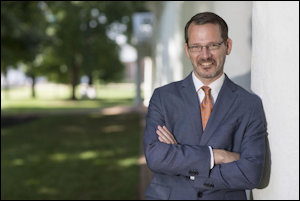
Ian Baucom, dean of the College of Arts & Sciences. Big Thinker on Campus.
As the University of Virginia approaches the 200th anniversary of its 1819 founding, university officials are thinking big. Very big. Change-the-world big. The university aspires to raise $4 billion over the course of a ten-year fund-raising campaign, and it has established a vision to match.
“What will it take to extend the unique promise of this place in the next century?”asked Ian Baucom, dean of the College of Arts & Sciences when addressing a gathering of UVa alumni at Richmond’s five-star Jefferson Hotel last night. His answer: Secure the university’s capacity “to bend the arc of history.” And not just on a national scale, but a global scale.
UVa’s newly defined mission is to evolve from a premier state university into an actor on the world stage addressing what Baucom called “seemingly insolvable global challenges.” Issues such as water scarcity and human health; religious pluralism and religious violence; understanding the neuroscience of autism and anxiety. In the process, UVa will produce a new generation of citizen-leaders, equipping young men and women to participate in a democratic society and contribute to the common good.
The new vision comes at a time that the university is undergoing “the largest turnover of faculty since the founding,” Baucom said, who came to UVa in 2014 after seventeen years at Duke University. The College of Arts & Science expects to hire 200 new faculty members within the next seven to ten years as the Boomer generation retires. The opportunity exists to hire the brightest young minds in the country, strengthen the university’s Ph.D. programs and bolster the university’s status as a world-class educational institution.
As part of this transformation, UVa is “re-imagining” the curriculum, Baucom said. Without going into details about how the current curricular requirements have gone astray — he merely said that it is possible to graduate without getting a grounding in writing on the one hand or math and science on the other — he described an overhaul that is scheduled to be executed by the 2017-2018 school year.
The curricular reform is not a matter of “tweaking” requirements but of thoroughly rethinking the meaning of a liberal arts education. One centerpiece, said Baucom, will be instilling a capacity to ask ethical questions — not to force-feed students the answers, but to teach them to work through the issues and reach their own answers. Another is to experience the arts “as a way of grasping the complexity and wonder of the world.”
On a more practical level, UVa’s new curriculum will hone students’ writing skills and teach them to use data as a way to understand “a world grounded in statistical and quantitative fact.”
The liberal arts should be rooted in “deep knowledge,” not just workplace skills, Baucom said. A core competency for liberal arts graduates should be the ability to express themselves well in writing, which he sees as “the articulation of thought.” He has taught at Yale, Duke and UVa, elite schools all, and has encountered students who cannot put together a grammatical, well-ordered essay. At UVa, some 30% of students test out of the university writing requirement. That will change. Mastery of writing will become a core of the curriculum. “Tweeting is not an education in how to express yourself.”
Also critical is a familiarity with data and numbers. In an age of “big data,” every profession and discipline is saturated with statistics. “Computation and data science are transforming everything.” Technology is transforming the world, creating the potential for good and bad. According to one analysis, he said, by 2050, between 25% and 40% of the workforce will be unemployable. Not unemployed, but unemployable — unable to find a job. (I believe he was referring to the world’s workforce, not the U.S., but my notes are not clear.)
To prepare UVa students for such a future, Baucom foresees more required courses and more inter-disciplinary courses. He anticipates philosophers co-teaching with biologists, historians with mathematicians. Students will be taking first-year classes in ethics and empiricism.
When asked about a recent letter issued by faculty and students expressing unhappiness with the university’s glorification of Thomas Jefferson, a slave-holder, Baucom said that he “fundamentally disagrees.” The signatories have a right to express their opinions, but he believes that they are “wrong-headed.” In an implied slap against the suppression of politically incorrect views on college campuses, he said that a university should be a place where “incredibly complicated” issues should be debated.
“It is not our job to tell students what to think. It is our job to teach them how to think,” he said. “We can’t tell them the right moral disposition.”
When addressing alumni, Baucom certainly emphasized Jefferson’s genius, vision and leadership. “We were founded by a revolutionary,” he said. And UVa needs to carry on in the same spirit as we live through “the revolutions of our times.”


